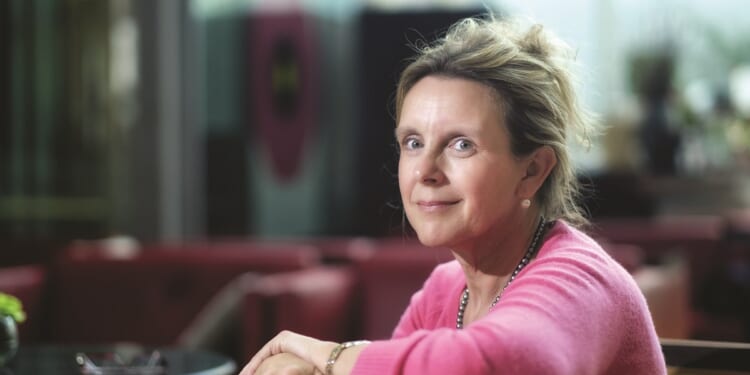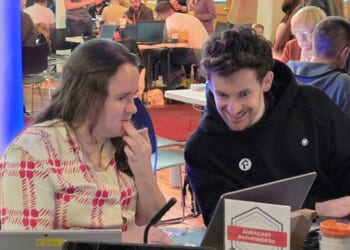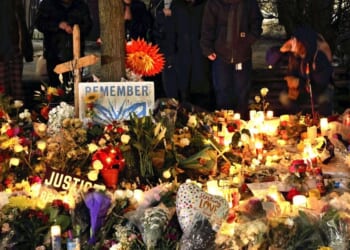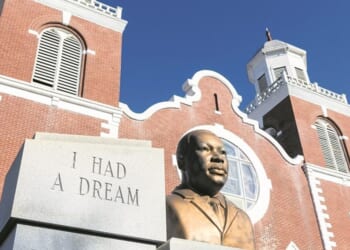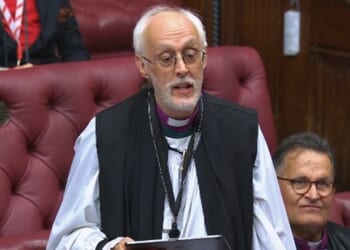THE word “evil” appears almost 600 times in the Bible (AV), where the human capacity for it is repeatedly set out. “The evil I will not to do, that I practise,” St Paul laments in Romans.
Dr Gwen Adshead, a forensic psychiatrist, has spent nearly 40 years in the criminal justice system — for almost 20 years, at Broadmoor Hospital (Interview, 5 March 2021) — assessing and treating perpetrators of violence. For her, “evil” is a word that comes up repeatedly.
“The word ‘evil’, of course, is not any kind of diagnosis,” she told a BBC audience during the second of her Reith Lectures (“Four Questions about Violence”) last year (Radio, 2 December 2024). “It’s a word that’s used in lots of discourses and not in the mental health one, and rightly so.
“Yet . . . my patients bring it up all the time. . . In fact, they ask the same questions that we’re talking about: ‘Am I an evil bastard? Can I change?’”
Her preference is to think of evil as an adjective rather than a noun. No good can come, she tells me, from thinking “that everything would be fine if only these evil people weren’t around”.
This — and the lecture that she delivered in St Martin-in-the-Fields this month as part of the “Here I stand” series, arguing that there was “no justification for making people suffer or have a miserable time in prison except to gratify feelings of revenge” — may seem to sit at odds with the prevailing attitude to violent crime in the UK.
Despite judges’ warnings about sentence inflation, about two-thirds of the public believe that sentences are not long enough. England and Wales have the highest prison population per capita in Western Europe.
In her first Reith Lecture, “Is violence normal?”, she posited that many perpetrators were ordinary men who had done an extraordinary thing, “for an ordinarily unpleasant reason”. Calling them “monsters” (as the press often does) achieved nothing to decrease the risk of violence. Rather, it risked giving perpetrators “a kind of awful status that may excite some people to further violence”, or dehumanised them “in ways that mirror what they did to their victims”.
Dr Adshead encouraged the audience to understand that, “if circumstances were different, I myself might find myself to be a violence perpetrator.”
The response to her lectures was, she tells me, overwhelmingly positive — contrary to her expectation that the BBC would be “overwhelmed on Twitter with people saying ‘hopeless, wishy-washy, woke liberal nonsense’”.
She senses in the response some relief: “An acknowledgment that a society that has no mercy . . . is not a society that any of us want to live in, because nobody knows when we might be in need of mercy.
“When people ask me about these things, I sometimes say, ‘I want you to think about the nastiest thing you’ve ever done. . . And how do you feel about that now? Are you proud? Feel ashamed? Feel upset? Wish you could take it back? Wish you could say sorry? Think you won’t do it again? Then you know what it’s like to be an offender.’ I think everybody knows. We have a capacity for great cruelty along with great goodness.”
IN HER lectures, Dr Adshead referred to “the sense of a terrible intersection of chance and choices” leading up to violent crime and often involving a long experience of severe mental illness, which might be aggravated by alcohol and drug use and “intense levels of fear and distress”. Half of the prisoners have experienced four or more kinds of childhood trauma. She sometimes thinks of those whom she works with as “the human version of a natural disaster”.
When it comes to the idea of an external evil, such as Satan, she describes her position as akin to C. S. Lewis’s: “It’s a mistake to believe in external evil too strongly, but it equally may be a mistake to dismiss it completely. But my experience of working with people who’ve done cruel and horrible things is that they need to understand how much it comes from them. . .
“I worry that if you locate it externally then it stops people from taking responsibility for their own cruelty, and I think that way is risky for all of us, because I think by locating evil outside you do encourage the idea of there is a group of people out there called ‘evil’.
“The other thing, of course, is that we don’t take this approach to goodness. We don’t say, ‘Goodness is out there and we will just wait for it to come and kind of fill us.’ We know we have to work at goodness.”
The book based on her Reith Lectures includes an extra essay on this topic. “I think we need to be focusing less on ‘Oh, look at those evil people out there,’ and a bit more on how we grow a capacity for goodness in each one of us,” she observes.
She worries that among the barriers to such cultivation are social media and the “dualistic, Manichaeistic” dialogues to be found there. “If you really want to practise goodness, do we need to think seriously about stepping way from fora and places where people are practising cruelty? Aristotle said, ‘We are what we do.’ How to be a good person is something that preoccupies most of our lives. Nobody gets up in the morning and says ‘I want to be an evil person today.’”
Goodness is often “quiet” and “subtle” she says: nothing like the performance of it to be found in online denunciations.
DR ADSHEAD, a committed Anglican, observes that, in opposition to dualistic thinking, the practice of confession “reminds people that we do have something to confess. . . It’s possible to be a really warm, loving person, and also a quite cruel and unpleasant person at the same time.”
Given the demands of listening to such confessions, the Church of England parish clergy need “much more pastoral training”, she suggests. “In a parish of souls, there will be people in great distress for all sorts of reasons, and some of those reasons will be very human and ordinary, and some of them will be perhaps rather disturbed, and not very ordinary, and a parish priest has to be able to listen to all of those, and look after their own mental health, and think about managing the boundaries around their time.
“It’s a really tough job. . . When I think about the training that I had as a psychotherapist to listen to distressed people, I wonder whether clergy get the same kind of training to listen, and how to be just a bit careful.”
In her own work, patients will raise spiritual and theological questions both overtly and indirectly, she says. “I have heard many times people saying ‘Will I be forgiven? Will God forgive me? Will my victim forgive me? Am I an evil person because I’ve done evil things?’ And I have heard spirited discussions about the nature of evil in therapy groups of people who’ve killed while they were mentally ill.”
In prison groups, people will ask “I want to be a good person, but how can I be after what I’ve done? What does the future hold for me after what I’ve done?”
It is work that has left her “very thoughtful about what life looks like after death, when you’ve caused a death. What happens existentially when you have caused great harm to somebody, and put yourself in a position vis-à-vis other people that means that you don’t know whether you are ever going to belong anywhere ever again, and what that’s like.”
Social isolation and exclusion are a risk factor not only for poor mental and physical health, but, potentially, for reoffending, she says. “We need them to be connected to some kind of community.” One of Christianity’s “many blessings” is “its psychological understanding that we are both an individual self, and also members one of another”.
In her lecture at St Martin-in-the-Fields, she made the economic case for offender rehabilitation, warning that, if the cost of imprisonment (£75,000 to £100,000) did not help a person to feel “less angry, hateful and vengeful”, then “it is simply money thrown away for the doubtful pleasure of treating a person badly. We have to find ways to get across the message that money spent on helping offenders change their minds for good makes most economic sense, and may make us happier. Our dreams of revenge — however seductive — are unaffordable.”
DESPITE the topic at hand, and without playing down the horrors of violence (she is keen to emphasise that she does not “float about in a kind of celestial neutrality”), Dr Adshead’s message is hopeful. The final Reith Lecture, exploring “Can we change violent minds?”, was recorded in Norway, where rehabilitation takes priority over incarceration.
“Treating prisoners badly may superficially look like solace to a grieving, rageful survivor or family of a victim, but it doesn’t work,” she warned. “In fact, the wish to hurt a prisoner is a mirror of the mind of the violence perpetrator. If you are wishing harm to someone right now because they hurt you, you know what it is to be an offender. That hatred, rage, and wish to hurt leads to further suffering and hopelessness, and the loss of happiness.”
“All these things that we have been talking about I struggle with like anyone else, but I believe in the possibility of goodness alive in the present moment and taking that seriously,” she tells me. “Not everybody, as I said in these lectures. It seems that the biggest challenge is working out who really can’t change their minds at all. But I have met enough people who have changed their minds for good to know that it’s possible, definitely possible.”
“Do not be overcome by evil, but overcome evil with good,” St Paul advises in Romans, a few short chapters after admitting to his own ongoing struggle.
The St Martin-in-the-Fields Autumn Lecture Series, “Here I Stand”, run in partnership with the Church Times, continues with speakers including Michael Ignatieff, Michael Rosen, and Mary Beard. Book tickets here. Four Questions About Violence: Insights from a forensic psychiatrist, based on Gwen Adshead’s Reith Lectures, is published by Faber at £9.99 (Church Times Bookshop £9); 978-0-571-39509-5.

